

The victims of the Russian invasion of Ukraine are not only thousands of people, but also animals. Among them, some have perished after being left behind in hastily evacuated apartments without food and water, while others have lost their owners due to Russian shelling and missile strikes. Hundreds of animals drowned when the dam of the Kakhovka Hydroelectric Power Plant broke in June this year, while others continue to suffer from shelling while living in the wild.
The Insider spoke to veterinarians and volunteers who continue to rescue animals despite the dangers of war. They shared stories of extracting bears from areas near exploding shells, performing a C-section on a chameleon during a blackout, saving and releasing owls, falcons, and roe deer back into their natural habitats, and even caring for lion cubs by having them sleep in the same bed.
Content
“Seryozha called from the frontline to check in on Casper, and then the calls suddenly stopped”
“When a projectile rips through the air, birds fall from the shockwave and break their wings”
“Over a thousand animals died at the ostrich farm, we saved the living ones by jumping over the corpses”
“Baron saves us from land mines and calms the animals that are scared”
“We used nets to catch animals from the sea that had been washed in after the Kakhovka HPP was blown up”
“Seryozha called from the frontline to check in on Casper, and then the calls suddenly stopped”
It’s not easy for Leonid Stoyanov to find time for an interview. “I don’t know if it’s ‘good afternoon’ or ‘evening.’ I have an operation now, and then I'll call you, if no one else comes,” he writes in response to our daily attempts to contact him. Leonid and his wife Valentina are among the few veterinarians in Ukraine who treat and evacuate exotic animals. According to Stoyanov, there are barely any specialists of their kind left in the country:
“In the treatment of exotic animals, it’s difficult to get the necessary skills — there are few such veterinarians, so we had to study and learn: we did internships in different countries and zoos, [we went to] conferences. That’s what we were doing before the full-scale invasion.”
Monobank: 4441 1144 5227 2014
Privatbank: 5168 7422 4487 7746
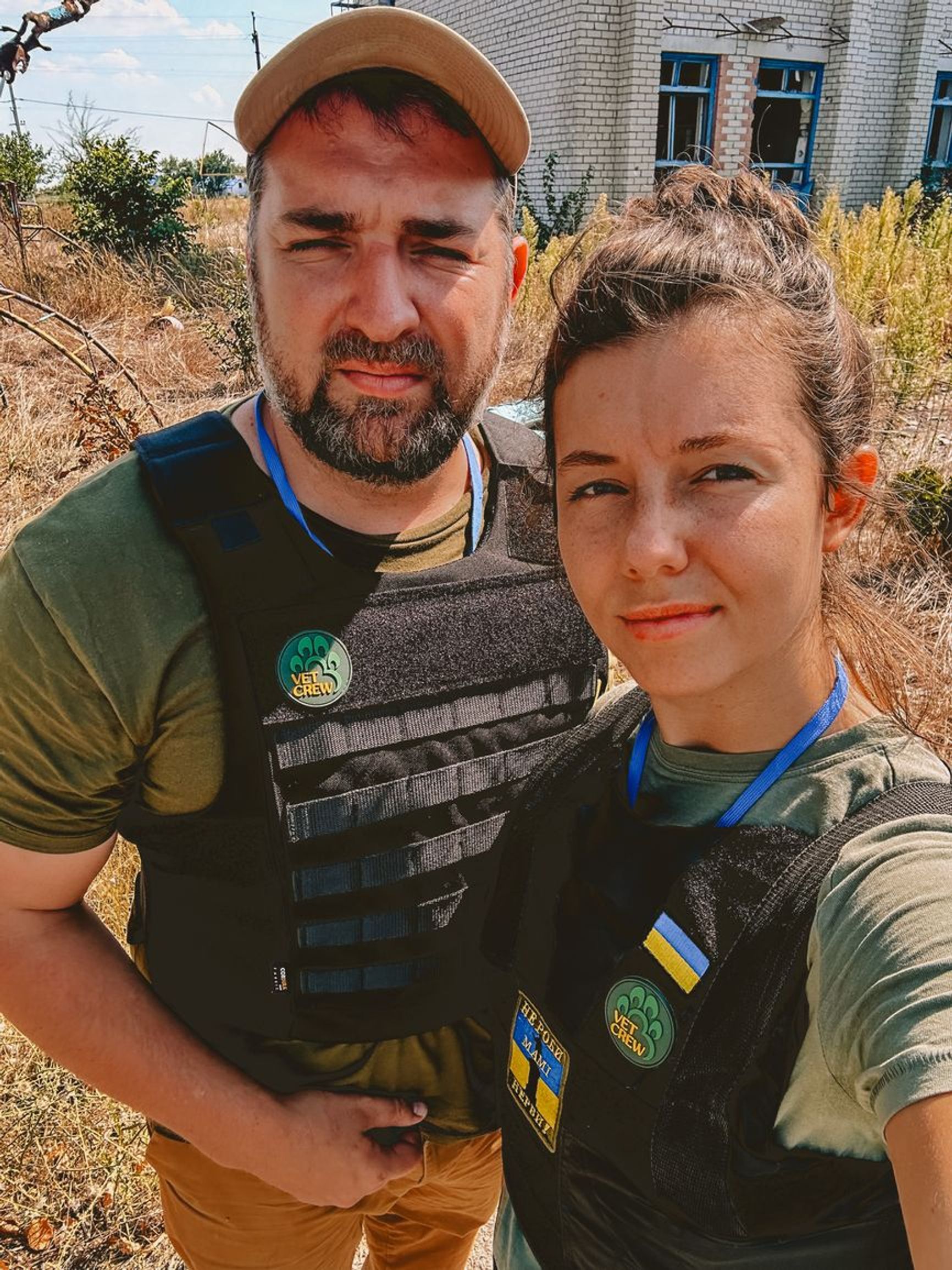
Leonid and Valentina Stoyanov
While pursuing their studies and attending conferences, Leonid and Valentina also established their own clinic. Vet Crew commenced operations on February 16, 2022 — just days before the onset of the full-scale Russian invasion. From the first days of the war, it transformed into a haven for hundreds of animals in need of rescue.
“In the first week of the war, people started bringing us animals — dropping them off through windows, leaving them outside their homes. We had over four hundred of them in our clinic, including small ones. After two weeks we started accepting both cats and dogs — there were a lot of abandoned ones, and we couldn't turn them away.”
There was so much work that the Stoyanovs only had time to sleep a few hours a night. During the Russian attacks on Ukraine's energy infrastructure, Leonid and Valentina had to perform regular blackout surgeries:
“Most of our patients are reptiles, and when the room temperature dropped, they developed various illnesses due to the cold. People reached out, asking us to care for their pets until the power was restored. Female chameleons encountered difficulties in laying eggs, leading us to perform caesarean sections to retrieve the eggs. Lots of chameleons then hatched from those eggs. We often conducted surgeries without electricity, using a headlamp, and Valya [Valentina] held an additional flashlight while assisting. Gas anesthesia didn't work, so we had to construct an improvised chamber for inhalation anesthesia. We continued working that way until we got our hands on a generator.”
Monobank: 4441 1144 5227 2014
Privatbank: 5168 7422 4487 7746
Some of the rescued animals were taken in by the vets themselves:
“For instance, we have Casper living with us; he's a husky who happens to be blind. Seryozha, a soldier in the military, discovered him tied up in the woods. Seryozha is an orphan and had poured all his love into this husky. He adored him deeply.
Seryozha reached out to us on Instagram, explaining that he was being deployed to war and couldn't take the dog along. But he couldn't bear to leave Casper in just anyone's care either. So, we took care of Casper during the time Seryozha was away at war. It was a tough separation for both of them. I asked my mom to look after Casper, telling her, 'Take good care of him; he's a very special dog.' Seryozha would call and message [from the frontline] to check on Casper, but then he suddenly stopped.
One night, my mom called me and said that Casper started howling and rolling on the floor hysterically. Later, we found out that around that time, Seryozha went missing, and it's likely he was killed — there have been no news from him for a year. Casper clearly sensed it. Casper continues to live with us, and my mom loves him. I've been in touch with my colleagues, and perhaps we can restore his sight in one eye.”
Monobank: 4441 1144 5227 2014
Privatbank: 5168 7422 4487 7746
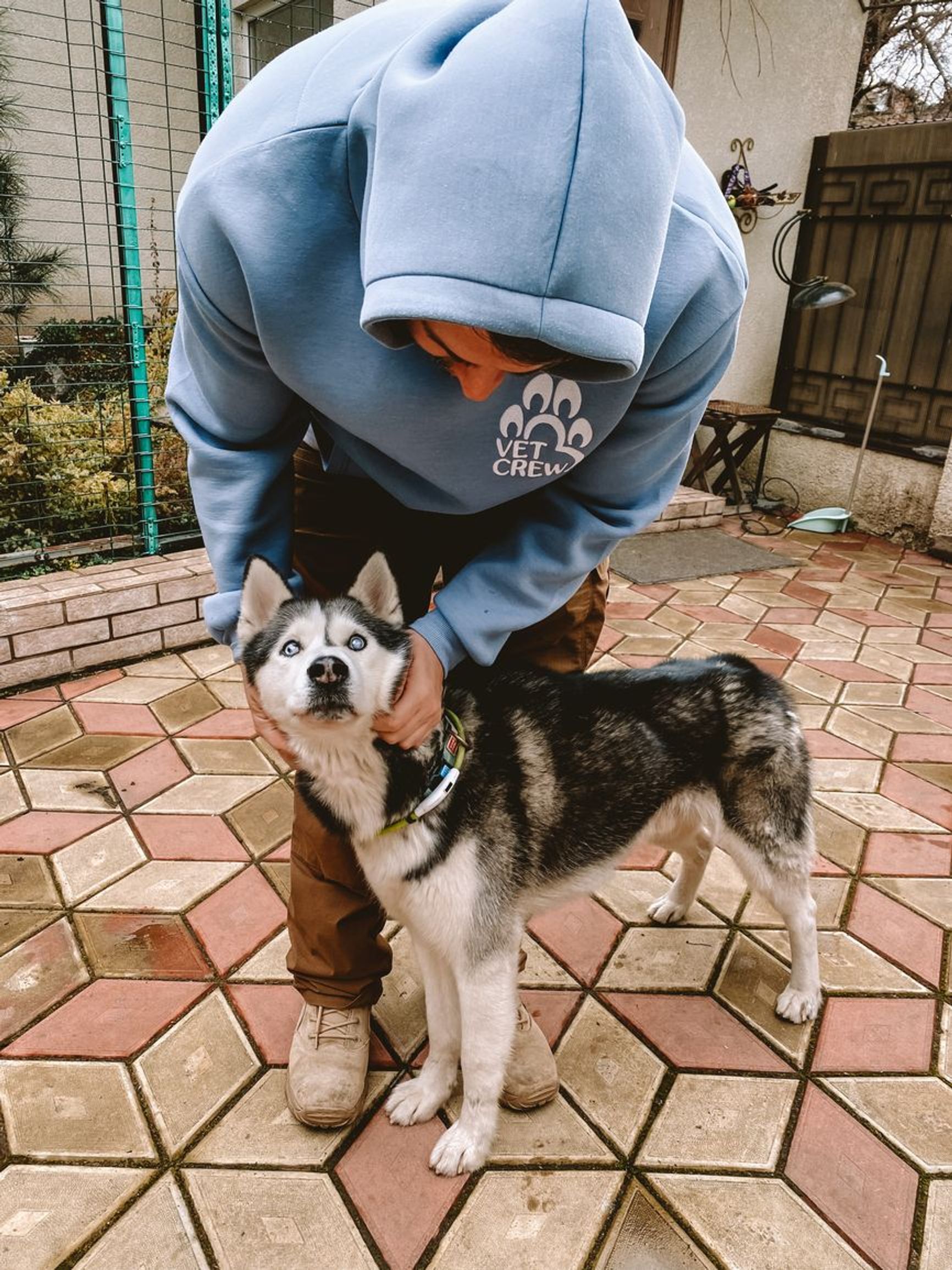
Casper, a blind dog taken in by the Stoyanovs after his owner was killed on the front line
Apart from Casper, the Stoyanovs also have another husky named Tso, who was saved by the vets after being found in a locked apartment:
“We received a call reporting a dog locked in the neighboring apartment — it had been sitting there howling for a whole week. We arrived, opened the door, and rescued her. Luckily, there was an aquarium inside from which she could drink. The owner eventually returned, expressing no concerns about us entering. He explained that during their evacuation, they were told they'd return in three days, so he left food for the dog in bowls and secured her inside because pets weren't allowed on the bus. He didn't take the dog and Tso has been living with us ever since.
It was difficult with her, because she grew up with Chinese owners, and didn’t understand a word of Ukrainian. And our neighbor told us that the owner often told the dog ‘Tso’ — in Chinese, ‘Tso’ means: ‘Let's go for a walk.’ And when we said 'Tso', she began happily jumping up and down, so that’s what we decided to call her.”
Monobank: 4441 1144 5227 2014
Privatbank: 5168 7422 4487 7746
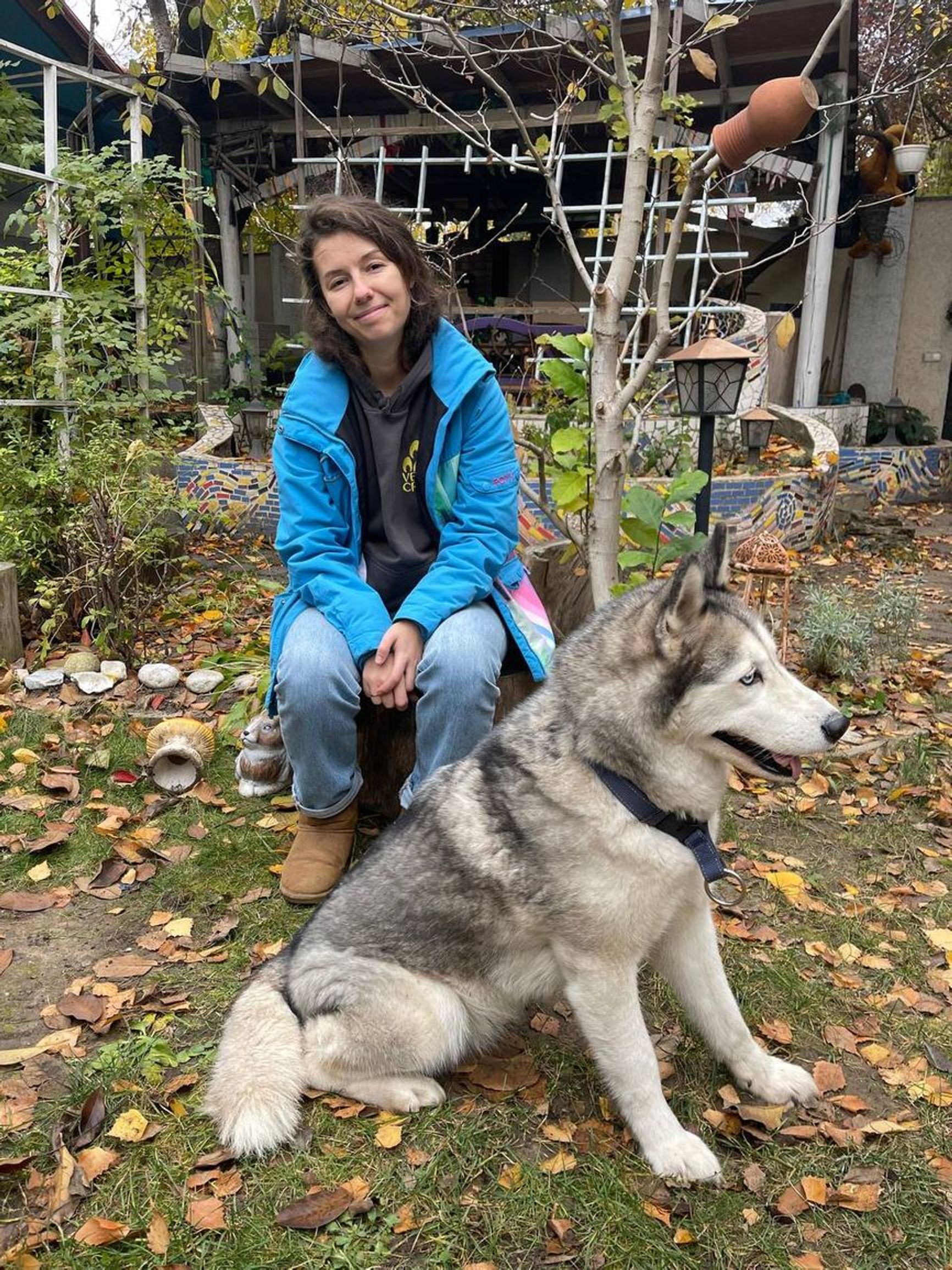
Valentina Stoyanova and Tso
Leonid and Valentina are actively seeking new caregivers for many animals left unattended, while some of the rescued pets have found refuge with their friends and relatives:
“We gave animals to anyone willing to take them in. Besides Casper and Tso, our family has a German Shepherd that people abandoned in their backyard. There's also another mixed-breed dog who couldn't find a new home, so we left it with my grandmother. We also care for Tosik, a Maghreb macaque we rescued from a contact zoo before the war.
Recently, we adopted a baby lynx as well. We received a call from animal.sos.odessa, a wonderful organization that helps animals. They often reach out to us for raccoons, swans, or other wild animals. They told us about a baby lynx in need of a home, and now we have him.”
Monobank: 4441 1144 5227 2014
Privatbank: 5168 7422 4487 7746
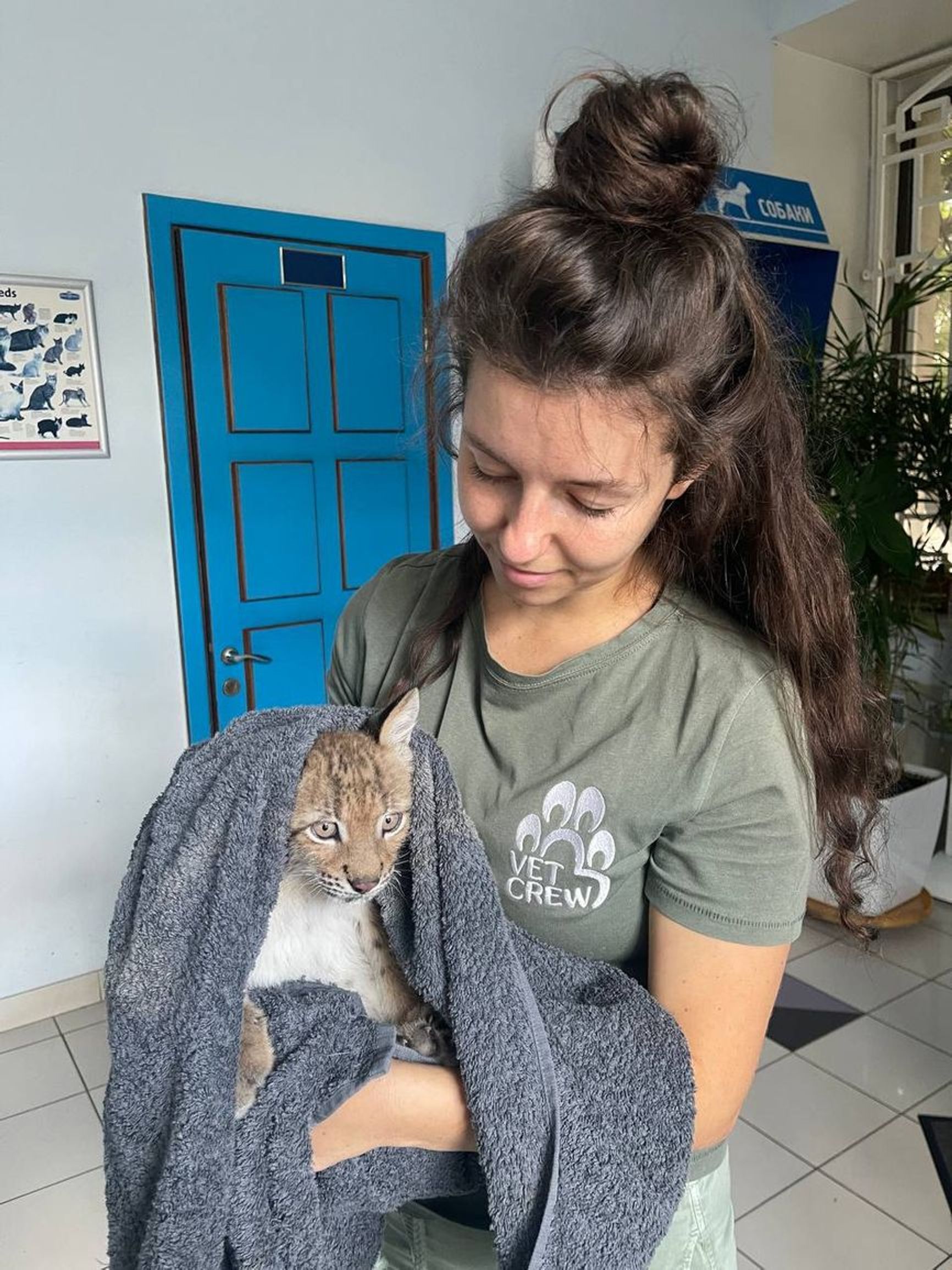
Valentina Stoyanova and an adopted baby lynx
“When a projectile rips through the air, birds fall from the shockwave and break their wings”
Apart from their efforts to rescue animals trapped in locked houses and apartments and their routine clinic appointments, Leonid and Valentina often travel to areas in the combat zone:
“When the front line moved towards Mykolaiv, we visited neighboring villages and distributed food and medicine. One such village was Shevchenkove, which was occupied multiple times. There, a man had been caring for numerous abandoned dogs and cats, so we provided him with food and vaccines. We continued visiting him for a year. During our last visit, he informed us that the people who returned to the village had sorted out most of these animals, leaving only one cat out of fifty.
On one of my trips I had to go to a village, and a soldier told me to take a shortcut. I drove off and looked: there were lights in the distance, and then I heard metal crackling on my car. I ducked down, gave it some gas, realized the Russians had fired at my car; there were bullet holes in it. They were quite far away — about 150 meters — but it was a frightening experience.
Valya and I also came under fire not far from Kherson while delivering medicines to animals and soldiers. Grads struck us pretty hard, but we managed to survive. A piece of shrapnel broke through the door and hit me through my vest — it got under my skin, but I think it's a small thing compared to what our soldiers are going through.”
Monobank: 4441 1144 5227 2014
Privatbank: 5168 7422 4487 7746
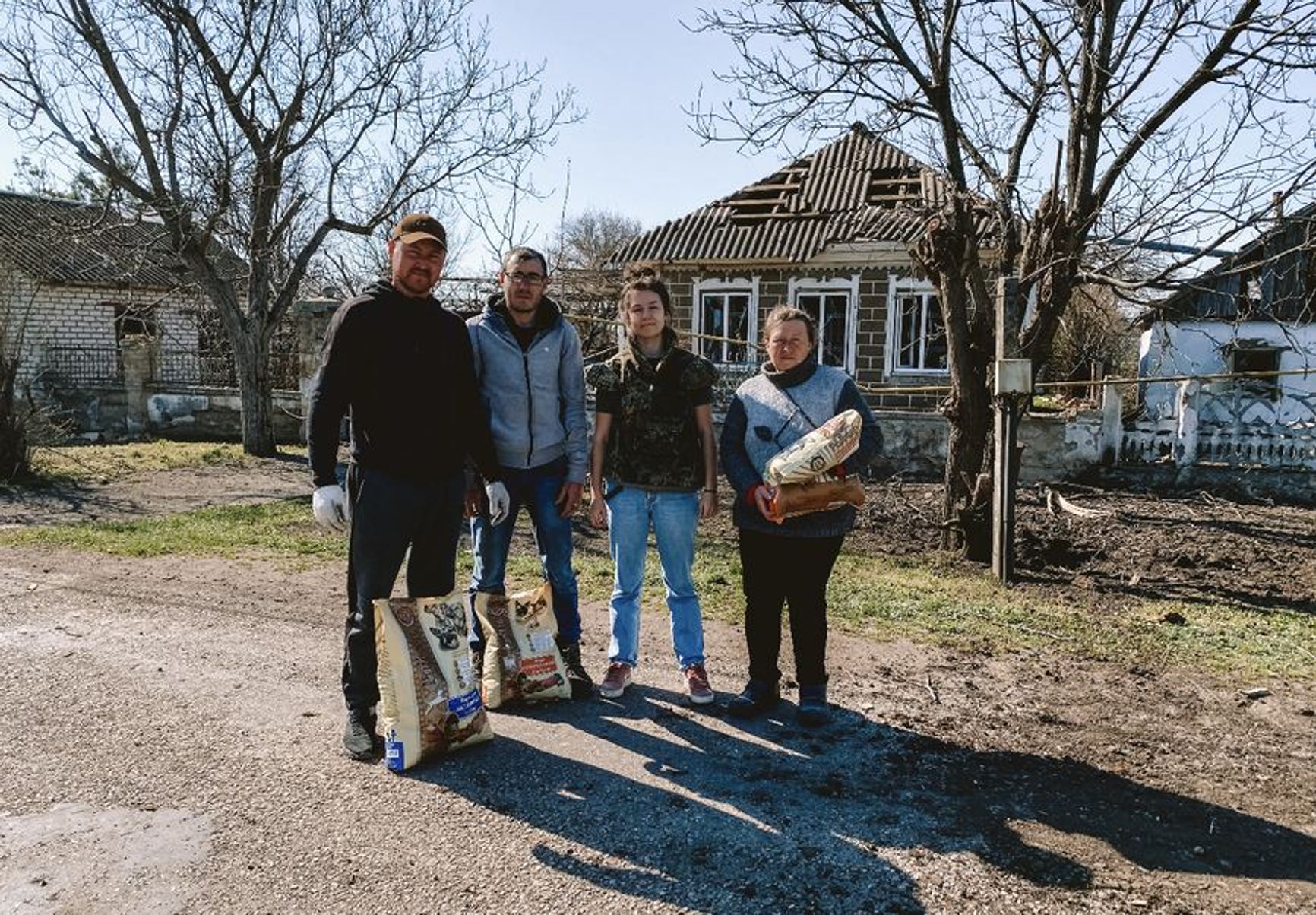
The Stoyanovs with humanitarian aid
Although Leonid says that operating amid shelling and the ever-present anticipation of incoming artillery and rocket fire has become part of every Ukrainian’s reality, the enduring stress and anxiety about the animals' well-being took a toll. In May 2023, Leonid suffered a heart attack:
“I had two heart surgeries. I was clinically dead for two minutes, but someone brought me back — that means I’m still needed here. Literally 10 days after the surgery, I was already traveling again, although the doctors said I should be careful for a couple of months.”
Explosions and shelling are not the only challenges doctors face. Even in peacetime, getting a sick animal to a clinic can be difficult:
“The animal has to be sedated or, as we say, 'put to bed.' [You can’t get them to a clinic] without doing that. If the animal is large, it can injure both humans and itself. After sedation, a monitoring system is connected to monitor the depth of anesthesia, the saturation and heart rate. Usually in these cases, we fold up the car seat, get the animal in the car, place it in a state of controlled sedation, and drive it [to the clinic].
We once picked up a concussed male roe deer who didn't realize where he was at all. We ‘put him to bed,’ transported him, treated him for quite a long time and then returned him to the wild.”
Monobank: 4441 1144 5227 2014
Privatbank: 5168 7422 4487 7746

A roe deer rescued by Valentina and Leonid
Birds suffer from the war no less than large animals, Leonid explains:
“A lot of birds are brought back by our warriors. When a projectile rips through the air, owls, eagles, falcons, which have a fine ear, fall from the shock waves and break their wings. Our guys pick them up, feed them, then bring them to us, we operate on them and then either release them ourselves or give them back to the soldiers who brought them. There are a lot of such cases. Birds are among those [who suffer from the war the most].”
Monobank: 4441 1144 5227 2014
Privatbank: 5168 7422 4487 7746
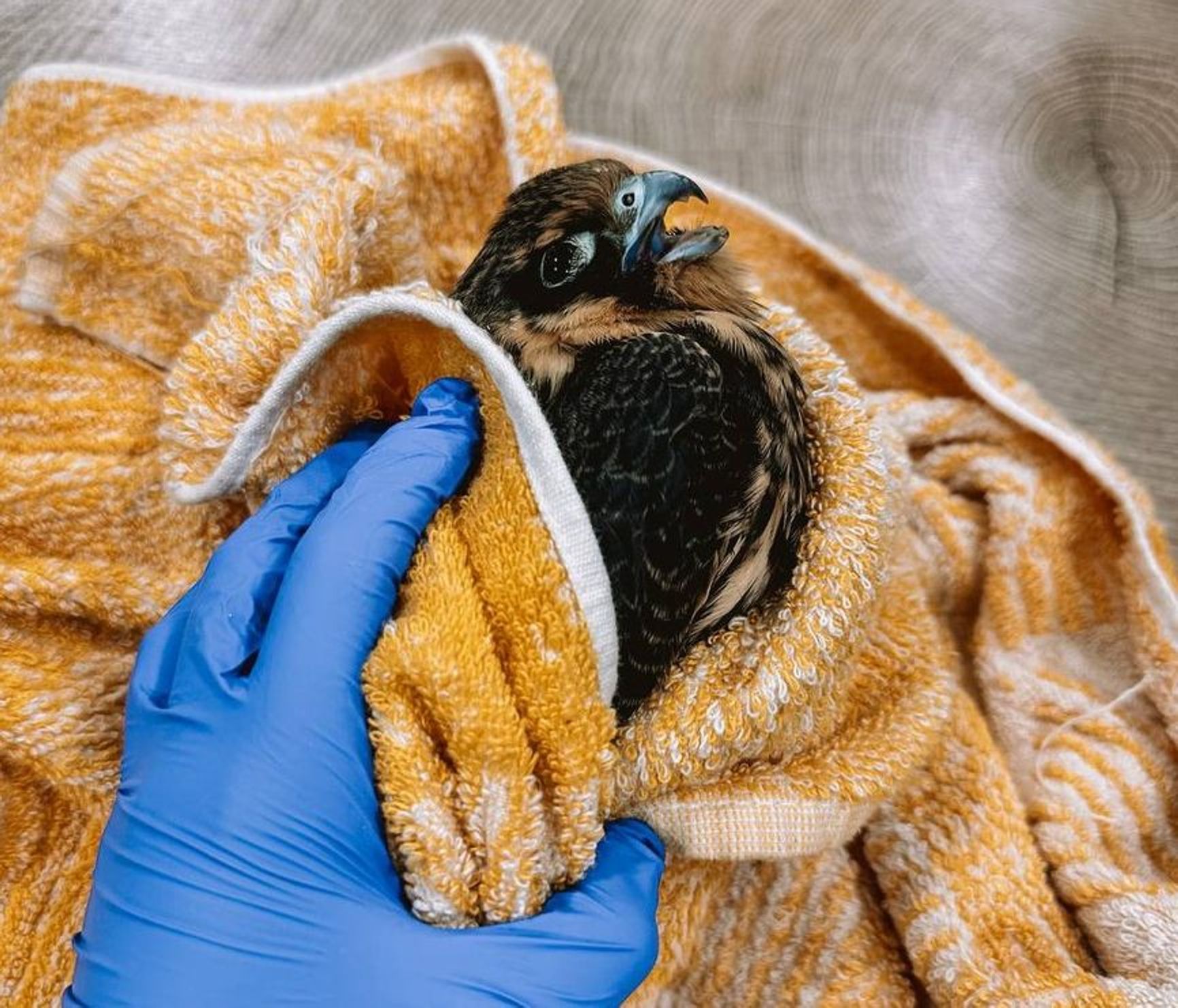
Birds of prey fall to the ground from projectile shockwaves and suffer contusions and fractures
“Just two days ago we set two owls free. One was probably concussed, because it couldn't see out of one eye — it kept turning its head, but it came to its senses pretty quickly when we gave it medication. We’ve treated two or three dozen owls since then.
The previous owl lived with us for six months — it had a complex fracture of its wings, and we had to fix them on pins very carefully. It was lucky that the fracture wasn’t on the joint, because if it was, the bird wouldn’t be able to fly.”
Monobank: 4441 1144 5227 2014
Privatbank: 5168 7422 4487 7746

The owl rescued by the Stoyanovs managed to recover from a compound wing fracture
Many people reach out to Leonid and Valentina, asking them to rescue their pets. When the vets go on trips to deliver aid or medical assistance, they often return with cages full of cats or dogs:
“When we bring food and medicine, we come back with kittens and dogs. We’re in the process of building a so-called rehabilitation center — a shelter. And we place animals there, which we gradually put up for adoption after medical examination, vaccination and microchipping.”
Monobank: 4441 1144 5227 2014
Privatbank: 5168 7422 4487 7746
When the vets travel to deliver aid or medical assistance, they often return with cages full of cats or dogs
In addition to pets, the Stoyanovs also foster animals from private zoos:
“We took in lion cubs anonymously because their mother was killed by a shell, and their owners didn't know what to do with them. We went to the combat zone, and these lion cubs were transferred to us through intermediaries in a sports bag. We nursed them for a long time. The previous owners had been feeding them goat's milk, but the animals were undernourished and constantly had diarrhea. I shared my bed with the smallest lioness because her belly was frequently swollen, and I had to keep massaging it. You'd massage for about 20 minutes, then drift off to sleep, and repeat. Now they're in the U.S., and they're doing well.”
Monobank: 4441 1144 5227 2014
Privatbank: 5168 7422 4487 7746
The lion cubs rescued by the Stoyanovs required extended care
The cubs were sent to the U.S. after rehabilitation
The lion cubs rescued by the Stoyanovs at their clinic
The Stoyanovs try to help everyone they can, but they have limited room for larger animals, and plenty of room for small ones:
“It doesn't matter whether it's a hamster, a chinchilla or a turtle. It's the value of the life you can save that counts. It's easy to feel mentally drained, but the driving force that keeps us moving forward is the sense of accomplishment when you take a frail, injured animal, dedicate time to nurse it back to health, and then set it free in its natural habitat. We recently released a falcon – you let it go, it soars into the sky, and you think, ‘I didn't live in vain, I didn't live in vain.’”
Monobank: 4441 1144 5227 2014
Privatbank: 5168 7422 4487 7746
“Over a thousand animals died at the ostrich farm, we saved the living ones by jumping over the corpses”
Natalia Popova works with large animals affected by shelling. Although she has no veterinary background, Natalia has been responsible for rescuing hundreds of animals abandoned by their owners when they fled war zones since the onset of Russia’s full-scale invasion. It all began with a lioness named Yana and the establishment of a shelter.
“The idea to create a shelter came by chance, even before the war. I was approached by Ursa.Major, an organization that fights against animal cruelty, with a request to rescue a lioness with an old spinal fracture and in a terrible condition. She was severely underweight and faced numerous issues, making it challenging for anyone to take her in. Back then, I owned an equestrian club and initially thought I couldn't help, since lions and horses aren't very compatible.
When they showed me this lioness, my heart stopped, as her condition was critical — she literally had hours left [to live]. We built a small enclosure overnight — 32 square meters, with a wooden floor, and the next morning I took her in. The organization promised to build an enclosure and provide me with meat [to feed her], but they couldn't do either.
I really hoped she would get better and stand up, which is why I wanted to build her a full-fledged spacious enclosure. Before that, she lived in a cage half the size with a concrete floor, whereas my enclosure is warm — but the conditions still aren’t good enough to keep such an animal.
So I created a Facebook page called ‘Lioness Shelter’ and started asking for help. But instead of getting help, I heard cries for help: ‘Help! The lion is dying!’, ‘The tiger’s dying!’, ‘The bear’s going to be put down!”.
I tried to help everyone. That’s how the Lioness Shelter became the Wildlife Shelter. After the full-scale invasion, I joined forces with the animal protection organization UAnimals and renamed it the Natalia Popova Wildlife Rescue Center.”
Monobank: 4441 1144 5227 2014
Privatbank: 5168 7422 4487 7746

Natalia Popova at the Wildlife Rescue Center
Photo: AP
Since the war began, Natalia has been venturing to combat zones to rescue animals that others were afraid to reach:
“Few people venture into rescues like these, right in the midst of shelling. The animals are in distress, and there's not enough time to save them all. Most often, these are privately owned animals – like bears or lions confined to small enclosures, just one and a half by two meters. When the shelling begins, people abandon them without food or water. Our military personnel discover these animals and seek assistance. That's when we step in to rescue them. The military covers us as best they can. Up to now, we've saved over 700 pets.”
Monobank: 4441 1144 5227 2014
Privatbank: 5168 7422 4487 7746
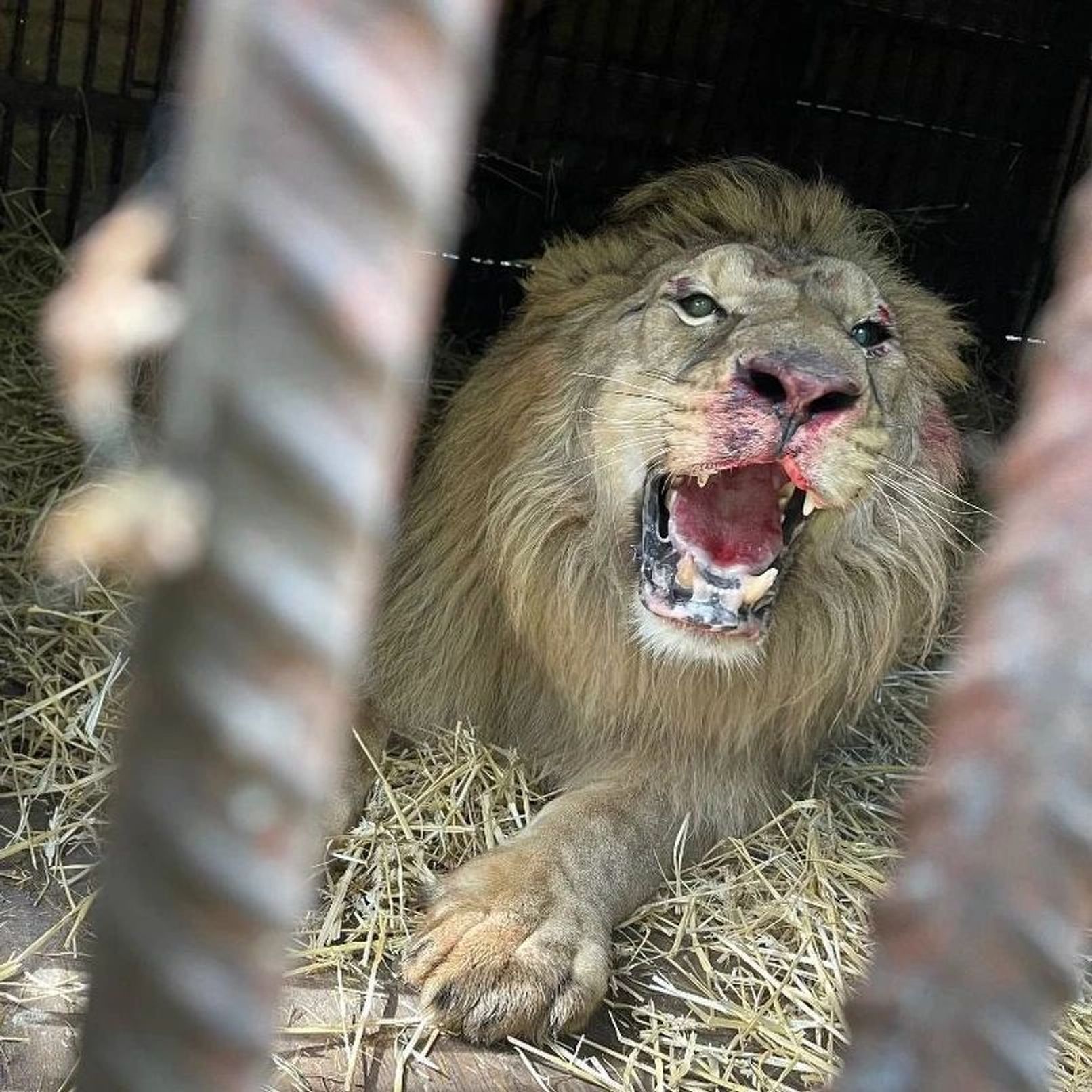
Pretzel the lion at the Natalia Popova Center. During the shelling in Kyiv, he was very frightened and beat himself against the cage
Photo: UAnimals/Instagram
Popova says that local vets won't go to these areas with her, so she had to learn how to sedate animals by herself:
“It's frightening to administer sedation to these animals when they're already in such a miserable condition — you’re scared of killing them. Thank God, no animal has perished due to this process so far. They’re emaciated. The severely wounded ones don't make it until we arrive. These aren’t scratches — these are serious wounds, which no animal will not survive if you don’t provide help at once.”
However, what troubles Popova the most is the owners' reluctance to report the abandoned animals:
“I realize it's difficult to take a lion or a bear with you, but people don't even call to ask for help. There was a case in Krivyi Rih where a man phoned in to inform us about a lioness that was stranded at his house that needed to be rescued. Most of the time, the military finds dead animals after the fact. Nobody even considers informing the checkpoint or reaching out to animal welfare groups about their animals.”
Natalia succeeded in rescuing one of these abandoned animals — a bear — from a bombed-out house in Bakhmut:
“We were with the military in Bakhmut, and we rushed into a private home that was already in ruins. The only thing left was a bear in an enclosure. Just seeing the bear made my hands tremble — it couldn't stand, it was completely dehydrated, and was in terrible shape.
The enclosure's roof had been pierced by shrapnel, leaving a hole over a meter wide. The enclosure itself wasn't very tall, about one meter eighty [centimeters], and the bear couldn't escape. It's quite risky to sedate such animals. Then the shelling began. The soldiers yelled at me, 'Let's go!' I asked, 'What about the bear?' No one left, but we came under heavy fire. By then, the bear had fallen asleep. We loaded him into a minibus and got the hell out of there.
We had many tense moments like that, but we always got away with nothing but a slight scare. I think it's because we’re doing important work and God protects us.”
Monobank: 4441 1144 5227 2014
Privatbank: 5168 7422 4487 7746

The enclosure of the bear in Bakhmut rescued by Natalia Popova
Photo: UAnimals/Facebook
Once the animals are rescued, they go through a recovery process, and decisions are made about what happens next:
“Unfortunately, we can't keep animals at our place for a long time since we’re not a zoo. Once there's a chance to relocate an animal to a suitable location, we arrange for transportation. If there aren't any safe and suitable options for keeping them in Ukraine, we send our animals to Europe, South Africa, America, or England.”
However, not all animals are so fortunate. Many die due to shelling and exhaustion, and some don't survive long enough to receive assistance. This was the case at Yampil Zoo and the Yasnohorodka ostrich farm. When Natalia and the military arrived, a large number of the animals there had already perished:
“At the ostrich farm, more than a thousand had died, we rescued the living ones by jumping over the corpses. There were not only ostriches, but a whole zoo: camels, llamas, alpacas, horned bison. Almost all of them were dead. We traveled there for six days on two or three trips, it was like a job of its own. We came yesterday, the animals were alive, and then we came back today and they were dead.
When we rescued the survivors, the Russians were approximately 300 meters from us. Later, they were pushed several kilometers away, and that's when we could retrieve the larger animals. Initially, we were climbing through bushes, seeking cover, and gathering any animals we could carry to the car. While we were doing this, shells were landing nearby — one fell just 70 meters ahead, and another about a hundred meters behind us. A machine-gun barrage passed nearby, but miraculously, we were unharmed. I've somehow grown accustomed to it, realizing that if it's meant to be, there's no escaping fate.”
“Baron saves us from land mines and calms the animals that are scared”
Apart from wildlife, hundreds of domestic animals have suffered from Russian aggression. Multiple animal welfare groups are actively involved in rescuing them in Ukraine, such as UAnimals, which began its work long before the full-scale invasion. However, since the war began, the organization's responsibilities expanded considerably after the war began:
“We help with pet food, vaccinations, sterilization, and financing the rebuilding of what the missiles destroyed,” says Olena, one of UAnimals’ volunteers. “That’s how we saved many shelters where the roofs were damaged.”
Monobank: 4441 1144 5227 2014
Privatbank: 5168 7422 4487 7746

A cat injured by shelling
Photo: UAnimals/Instagram
UAnimals volunteers also frequently travel to war zones to rescue abandoned animals:
“It doesn't matter who — cats, dogs, rabbits, pigs, cows, sheep, goats, horses. We rescue everyone we can. We get a lot of calls from the military. Unlike the Russians, our [soldiers] don't shoot the animals, they try to save them. They call: ‘We pulled out a kitten, she's pregnant, and by the time we came to you, she’d already given birth.’ It’s hard to say how many trips we’ve made so far — over two hundred, and the number of rescued animals is already in the thousands. Sometimes a hundred animals can fit into one bus, sometimes 15 to 16, depending on their size.”
Monobank: 4441 1144 5227 2014
Privatbank: 5168 7422 4487 7746
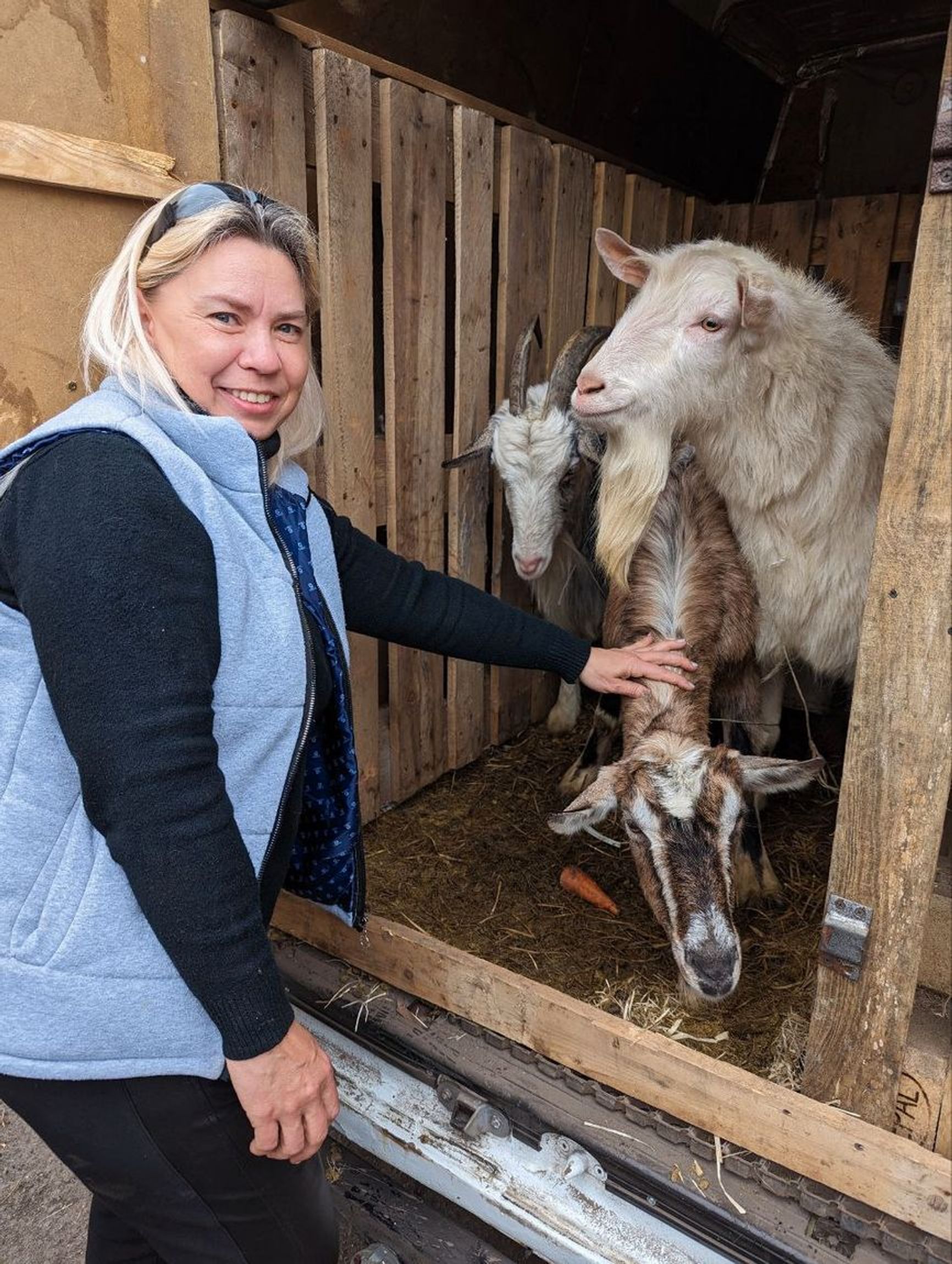
Olena with rescued animals
Photo: Olena, UAnimals
Olena clarifies that they exclusively operate based on requests. The organization's website has a dedicated form for submitting appeals:
“We get a message that someone needs to be evacuated somewhere — we get a mission together and leave immediately, because going without a plan is a big risk. Sometimes we go to locations and rescue one animal at each address, and sometimes we arrive to find twenty animals in a single house.”
Monobank: 4441 1144 5227 2014
Privatbank: 5168 7422 4487 7746
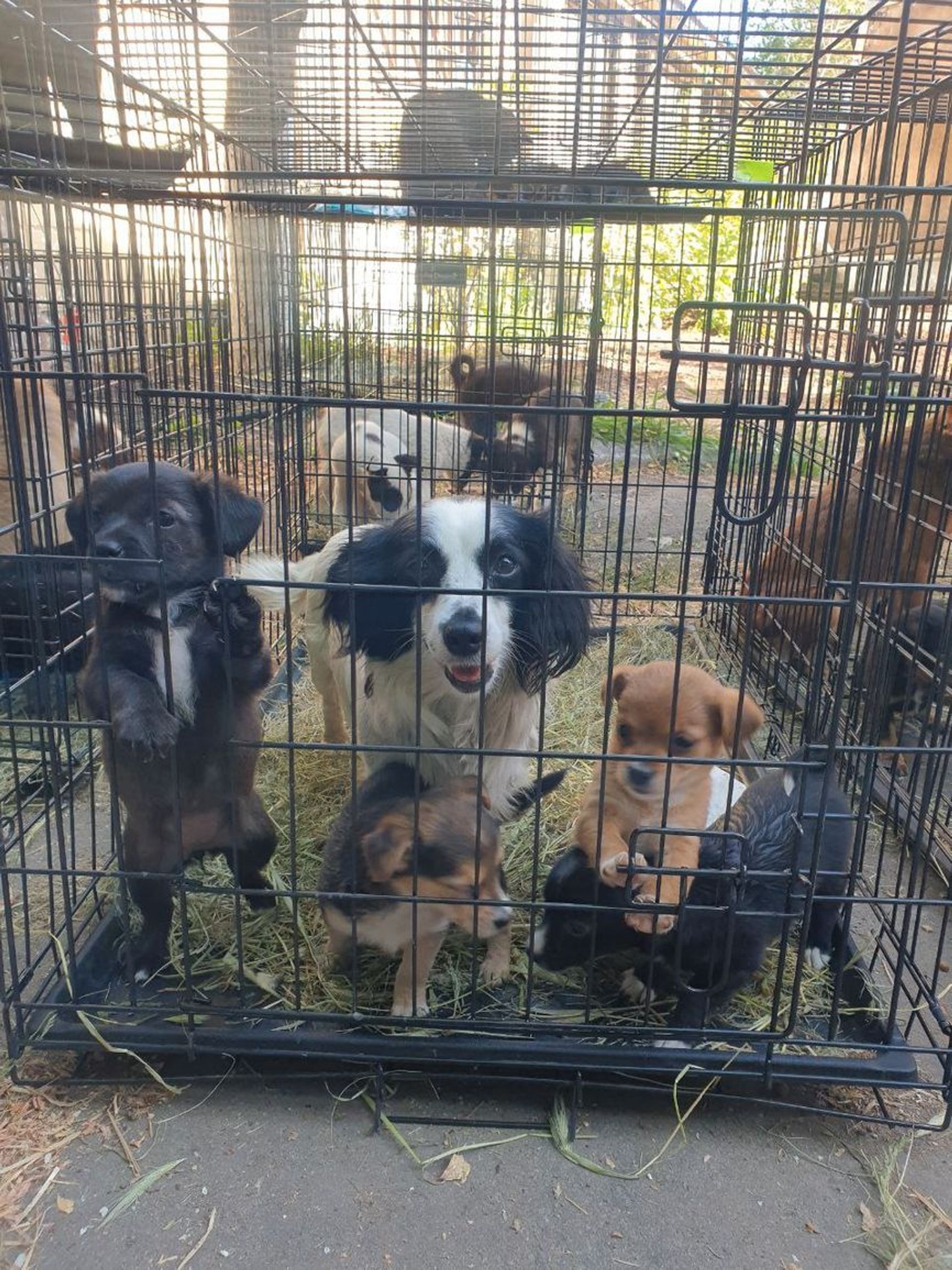
Dogs rescued by UAnimals
Photo: Olena, UAnimals
During the first months of the war, UAnimals volunteers managed to rescue mutliple dogs and cats, as well as several large wild animals:
“In Bakhmut, amid ongoing shelling, we rescued a bear. We named it Bakhmut in honor of the place it was saved. Similarly, in Lyman, we rescued another bear, and we named it Lyman. We typically name them after the locations they come from. In Yampil, there was a small zoo, and among all the animals there, only the bear survived. The area was under occupation, and upon inspecting the enclosures we could access, we found that all the other animals had been shot.”
Monobank: 4441 1144 5227 2014
Privatbank: 5168 7422 4487 7746
Volunteers constantly put themselves in danger. However, Olena explains, when they're in the midst of rescuing another cat or dog, they hardly have the time to think about it:
“In our work, we concentrate more on the animals, because if you think about whether or not you’re going to be hit, it's better not to go anywhere. You have to go to the frontline areas calmly, keeping your composure. You need to realize that there’s shelling, rockets, mines, and you can get hit at any second. There are people who go and then make a lot of mistakes in panic. We have already had a few injuries — thank God they’ve been light ones. As they say in the military, if you don't hear your rocket, you can't do anything about it.
We load as many animals as we can and leave the area. In these moments, lingering at one location makes you an easy target. I was hit once while carrying a cat to the car. When the shelling began, I held her close to me so she wouldn't get more frightened and I wouldn't get hit. I threw her into the crate and we drove to a safe place, and we managed to get help on the way.”
Monobank: 4441 1144 5227 2014
Privatbank: 5168 7422 4487 7746
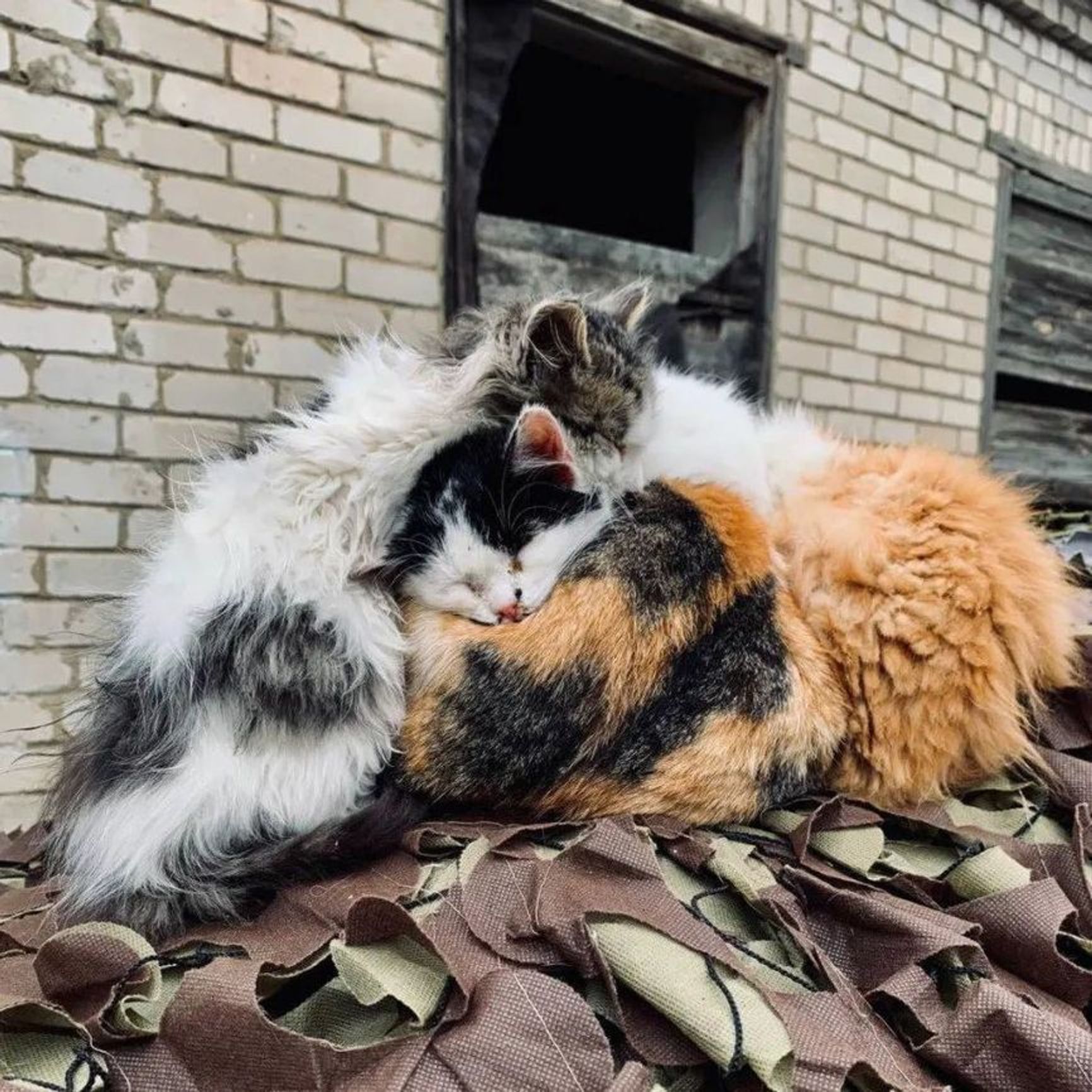
Cats frightened by shelling
Photo: UAnimals/Instagram
Baron the dog helps the volunteers on their trips — he provides the frightened “patients” with psychological support:
“He’s our mascot, he works as a psychologist. I don't know how he does it, but he communicates with all the animals. They’re all frightened here, and he’s like a sedative for them, he calms them down.”
Monobank: 4441 1144 5227 2014
Privatbank: 5168 7422 4487 7746
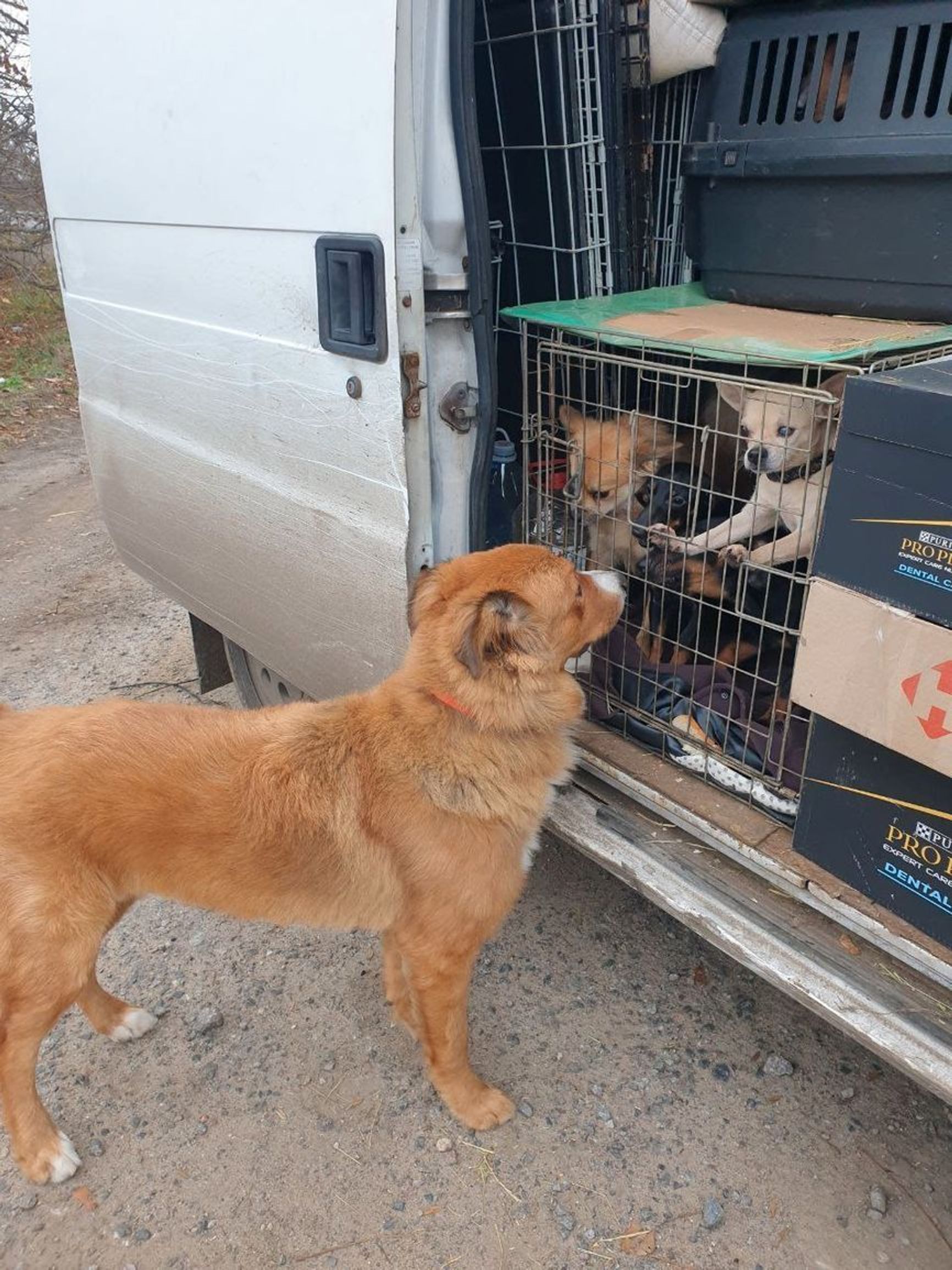
Baron calming other dogs down
Photo: Olena, UAnimals
“We rescued Baron in the first days of the war when we were delivering aid to the military. We picked him up at a checkpoint near Bucha — he had joined the military there, we treated him. He had a laceration near his tail, and that's how he stayed with us. No one could give him away — we were too attached to him. At first he traveled with us while he was being treated, and then he stayed with us for good.”
Monobank: 4441 1144 5227 2014
Privatbank: 5168 7422 4487 7746
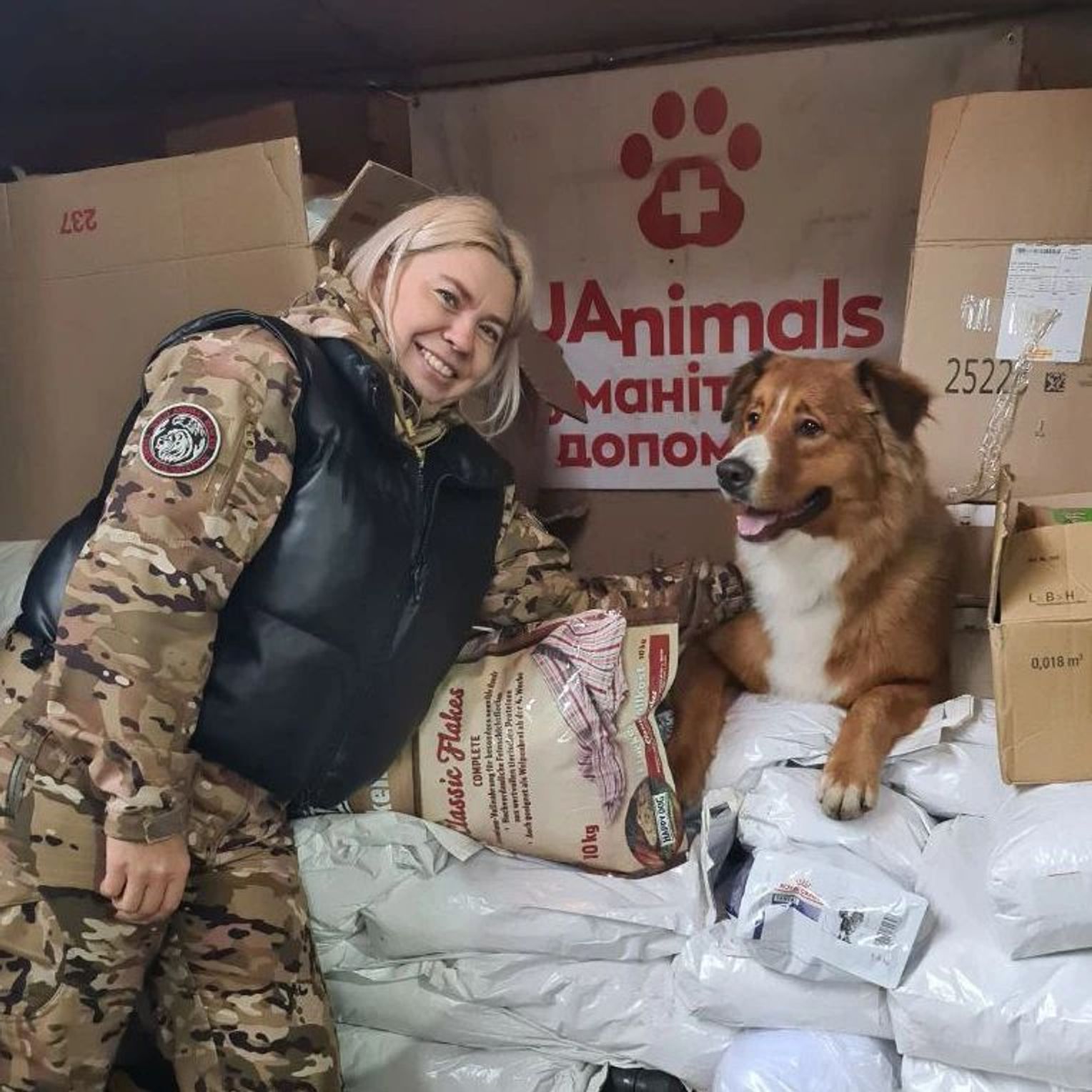
Olena with Baron
Photo: UAnimals/Instagram
“Often, we arrive at locations where there's nothing left at the specified address — just a particular point. We start searching for destroyed buildings, guided by photographs. Baron came to our rescue on multiple occasions on journeys like that. He'd signal us by barking or stopping suddenly, alerting us to the presence of a mine. Once, he even warned me with a sound when I was about to step on a tripwire. My husband managed to pull me away just in time, following Baron's last-second bark. We hadn’t trained him for these situations; it's simply one of his natural instincts. He consistently senses danger, whether it's for me or my husband.”
Monobank: 4441 1144 5227 2014
Privatbank: 5168 7422 4487 7746

Baron and a rescued dog
Photo: Olena, UAnimals
Valeriia, a volunteer with the Veterinary Evacuation of Animals foundation, also constantly works under fire:
“We arrived at a location just 9 kilometers from the Russian border, it was constantly being shelled, and many injured animals needed treatment. During mortar shelling or rocket attacks, animals can get highly stressed and become aggressive, injuring themselves, or running away without realizing where they're going.
We encountered a lot of wounds that needed treatment and stitching up. We actually have a lot of work to do. Moreover, residents from frontline towns and villages often approach us with a large number of animals from their homes, taken from neighbors who have fled.
On average, each person has over a dozen of these animals to care for, requiring food and attention. However, sourcing food can be challenging, particularly in villages facing constant shelling. Humanitarian aid often provides basic necessities like porridge, which people feed to these animals and bring to us for evaluation.”
“We used nets to catch animals from the sea that had been washed in after the Kakhovka HPP was blown up”
The disaster at the Kakhovskaya Hydroelectric Power Plant (HPP) posed the most significant challenge for both animals and volunteers. Experts believe that the consequences for the ecosystem are irreversible, and it may take years to restore the flora and fauna in the vicinity of the HPP. Ecologists at the Ukrainian Nature Conservation Group (UNCG) reported that most of the organisms in the Kakhovka reservoir perished in the initial days of flooding in June, and it will likely take about a decade to restore fish populations. The outlook for birds is even bleaker — according to experts, some nesting species in the area will simply disappear.
Leonid Stoyanov admits that this tragedy was one of the most difficult moments for him during his entire work:
“When you realize that millions of animals perished because someone chose to destroy everything, it's difficult to find the right words. The explosion at the hydroelectric power plant resulted in a massive flood that swept away all the animals in the reservoir, including tritons, turtles, lizards, fish, and nesting birds, some of which are endangered species. They were carried into the Black Sea, where the salty water began to drain their moisture. We used nets along the shore to rescue them.
Many animals, like deer, wild boars, and waterfowl chicks, were found dead in the Gulf of Odesa. We managed to collect several hundred newts, turtles, and frogs along the coasts. We transported them to our clinic, provided treatment, and then released them into the Danube Biosphere Reserve, which has large lakes where they can be safe. However, this represents only a tiny fraction of the animals that died there.”
Monobank: 4441 1144 5227 2014
Privatbank: 5168 7422 4487 7746
Leonid Stoyanov spent most of his time in Kherson sailing with the Red Cross. During this time, they witnessed many different things, some tough and others heartwarming:
“There was one village that turned into an island — it was completely surrounded by water, and a large number of animals were cut off. And a boy and his grandmother who lived there collected them all — they had a dozen cats and dogs. So we swam over and picked them up. And then our subscribers asked us to help this family — they had lost everything in the flood, and we helped them because they were so kind to the animals.
I remember one dog that had swallowed water and had a giant belly. When I pushed her, water sprayed out of her mouth like in the cartoons. It took us a while to clean her up, and a journalist we know adopted her. Now, that doggie is doing well.”
The volunteers had to take risks all the time:
“Everything was tough. Picture this: you're in a rubber boat, a cat perched on the roof of a house with only the tip visible above the water. You're surrounded by water as far as you can see. We were concerned about damaging the rubber dinghy when approaching these houses, so we had to be extra careful. I recall another dog we rescued; it was clinging to a pile of debris for a long time. We did our best to rescue everyone we could, whether they were on house roofs or in trees.”
Monobank: 4441 1144 5227 2014
Privatbank: 5168 7422 4487 7746

A submerged house in Kherson
One of Leonid's videos, capturing the rescue of several kittens that were struggling to stay near a fence, went viral:
“After this video, about a thousand people wrote to us saying they wanted to take the ginger kitten. One woman found us through her friends that worked in the security services. I thought that her persistence deserved to be rewarded. She came from Kyiv, took this kitten and named it Leo, sort of in honor of me, as it turned out. And we kept the other kitten, because the people we gave it to brought it back when it got sick.”
Monobank: 4441 1144 5227 2014
Privatbank: 5168 7422 4487 7746
The situation was more complicated in the occupied territories — the Russians didn’t allow volunteers in and shelled those who tried to help both people and animals:
“When we were working in Kherson, our boat was shot at,” says Olena from UAnimals. “One time we were thrown back by a wave when a mine flew in, and another time the boat began sinking. We had just moored then, someone managed to run away, and someone else was wounded. Then we were shown a video posted by the orcs [a derogatory term used in Ukraine as a dehumanizing term for the Russian enemy — translator’s note], where they were shooting volunteers, and there was our red boat with a white stripe.”
Monobank: 4441 1144 5227 2014
Privatbank: 5168 7422 4487 7746
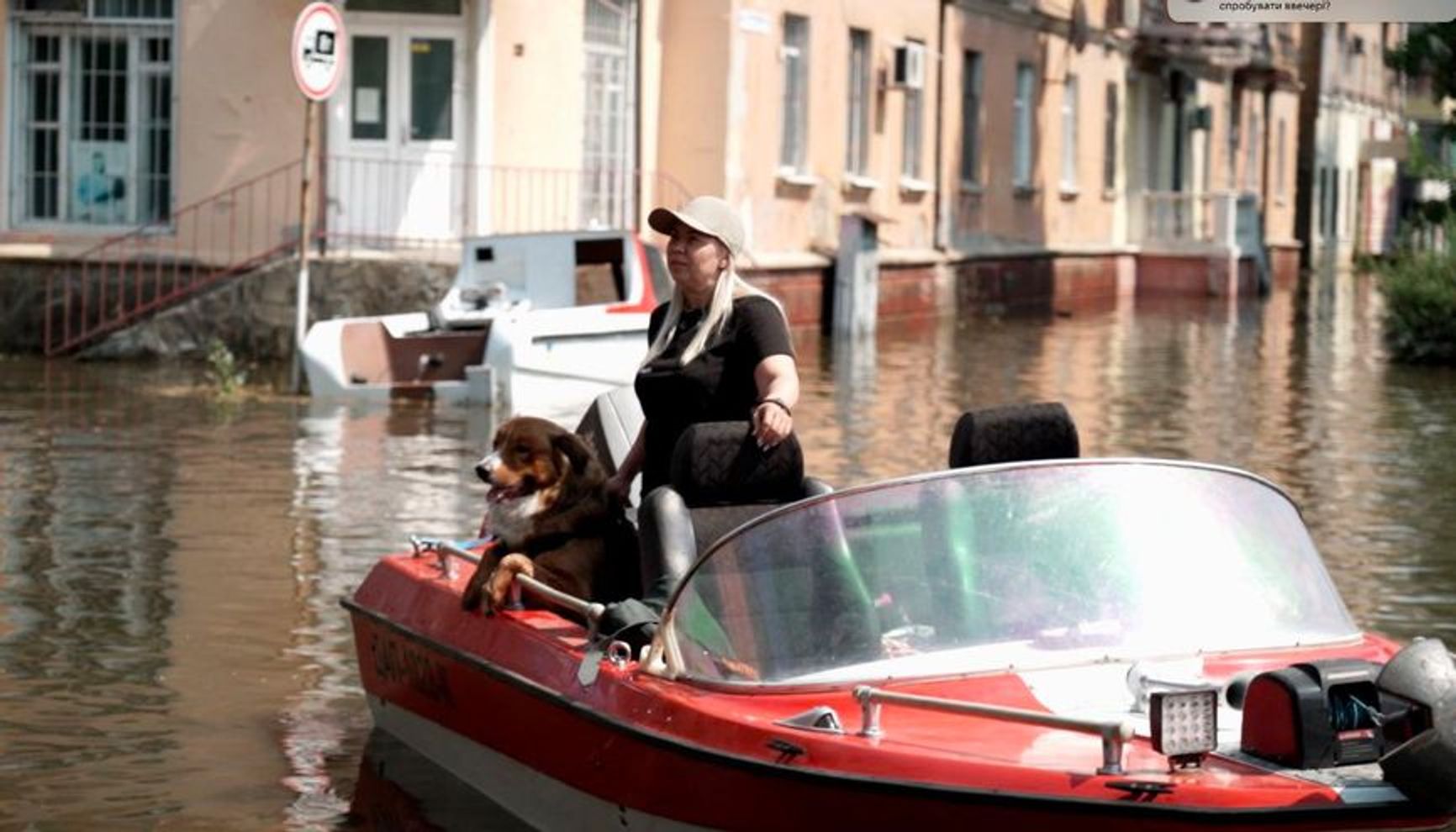
Olena on a boat during the flood in Kherson
The hardest part for the volunteers was witnessing homes completely submerged, with animals trapped inside. Valeriia, a volunteer from the Veterinary Animal Evacuation Foundation, explained that some houses were entirely underwater, with only the treetops visible:
“We were on a boat, and my friend spotted a house with a cat perched on the fence, surrounded by water. We approached slowly, and I climbed onto the roof to reach the cat gently, so as not to frighten it. I lifted it by the scruff of its neck, and surprisingly, it didn't scratch, probably realizing it was being rescued. It was the second or third day after the flooding, and the cat hadn't eaten or drunk anything, so it was extremely weak. We gave it water and food right away.
Then we went to another house where we found three cats and a dog in the attic. They were frightened and emaciated.
Some animals resisted, and it took us quite a while to rescue them. We had special cages on our boats to place them in, and if possible, we tried to feed them immediately. We also had sedatives. I gave a sedative to each animal to help reduce their stress. In some cases, we had to increase the dosage to help them sleep.
There were times when we ran out of cages, and animals jumped into the water due to shock. I remember we saved three dogs, and they attempted to return to the water, so we had to fish them out again and bring them back.”
One of those disoriented dogs almost caused Valeriia to drown:
“We spent about an hour trying to fish a dog out of the water. Initially, we wanted to feed her to gain her trust, but she was scared. We left food where part of the roof was still intact and waited from a distance. But as soon as we made a move in her direction, she bolted. My friend went to help evacuate animals from neighboring houses to make the most of our time. I remained alone with the dog and had a syringe with a sedative.
When she approached some tree branches that reached the roof and hid behind them, I cautiously approached those branches, leaned on them, and placed a bowl of food nearby. While she was eating, I attempted to inject her with the sedative.
After giving her about half of the drug, the dog suddenly jumped up and ran off. I rushed after her, but slipped off the branches and fell into the water. It was a frightening moment — I was alone, there was gunfire in the background, and the current was strong. The dog was almost entirely in the water, and I tried to grab her, but it was impossible.
I called the guys for help, got out of the water, and we swam after the dog in the boat. She was struggling against the current, barely moving. My friend managed to catch her with his hands, and we quickly placed her in a cage. Unfortunately, my friend was bitten by the dog in the process.
We eventually found new owners for the dog in Kyiv. Sadly, they had difficulties handling her, and she managed to escape by slipping out of her leash. This was not the happy ending I had hoped for, because I managed to find homes of almost all the animals [we rescued]. I was even thinking of keeping her because we came all that way to save her. I really blame myself.”
The majority of animals in distress were cats and dogs, but there were occasional surprises. Valeriia once came to the aid of a chicken:
“When we were returning to the shore, we saw a floating board with a chicken on it — it was trying to peck the board, but there was water all around and it was just waiting to die. Chickens are simple creatures; you feed them, and they lay eggs. But when they handed her to me, she clung tightly, nestled her beak into my hand, and drifted off to sleep. She had likely been there the entire time. Later, my colleague's brother took her in.”
Monobank: 4441 1144 5227 2014
Privatbank: 5168 7422 4487 7746

Valeriia with rescued animals
malyk_8/Instagram
“Certain animals adjust right away, while others need time. We have a dog who still barks constantly due to the trauma he went through.”
Animal welfare organizations and veterinarians like the Stoyanovs are able to continue their work during the war thanks to voluntary donations and support from foreign partners.
You too can do your part to help save animals suffering from the war.
You can donate to the Stoyanovs on the Vet Crew website.
Natalia Popova accepts donations sent via bank transfer or via Patreon.
You can donate to the UAnimals organization on its official website.
Monobank: 4441 1144 5227 2014
Privatbank: 5168 7422 4487 7746